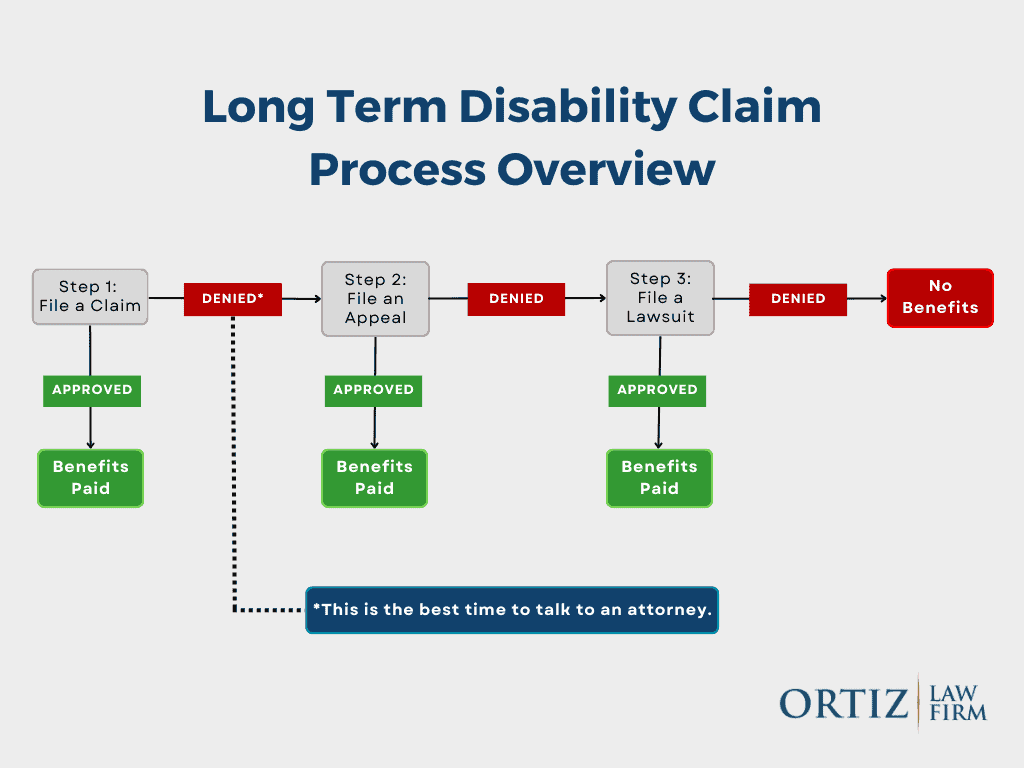If you’re unable to work because of cirrhosis, you might be eligible for long-term disability (LTD) benefits. The insurance company will assess your claim based on information from your medical provider. Medical evidence, including your doctor’s diagnosis and treatment plan, along with a detailed explanation of your symptoms and resulting limitations, are essential to support your claim. If your claim is denied, a long-term disability attorney can help you file an appeal.
What Is Cirrhosis?
Cirrhosis is the late stage of scarring of the liver created by advanced diseases like hepatitis and chronic alcohol use. Each time the liver is damaged, it tries to repair itself. Each time it tries to repair itself with scar tissue, making it difficult for your liver to function properly.

Cirrhosis cannot be reversed, and advanced stages are life-threatening. If diagnosed early, treatment and lifestyle changes can help slow down the progression of cirrhosis.
Symptoms
Cirrhosis often has no symptoms until there is liver damage. When you do start showing symptoms, seek medical treatment. Signs and symptoms of cirrhosis may include:
- Fatigue;
- Nausea;
- Weight loss;
- Yellow discoloration of the eyes or the skin;
- Itchy, flaky skin;
- Loss of appetite;
- Drowsiness and mild cognitive impairment;
- Liver cancer.
Causes
There are many causes of cirrhosis, and any chronic liver disease that causes chronic hepatitis can cause cirrhosis. The most common are:
- Heavy alcohol use causes alcohol-induced hepatitis, leading to chronic liver damage. While alcohol misuse is a well-known cause, non-alcoholic factors are also common.
- Excess fat buildup in the liver, called non-alcoholic steatohepatitis, can harm the organ. This relates to issues like high blood lipids, blood sugar, and blood pressure.
- Hepatitis C is a viral infection that becomes chronic in most people. It’s now curable with antivirals, but many don’t realize they have it.
- Hepatitis B is another viral infection that can turn chronic in some cases. If it does, you’ll have it for life, though it’s treatable but not curable.
Less common causes include:
- Certain autoimmune diseases like autoimmune hepatitis, primary biliary cholangitis, and primary sclerosing cholangitis can trigger chronic liver inflammation.
- Inherited disorders like glycogen storage disease, cystic fibrosis, and Wilson’s disease may allow toxic substances to accumulate and damage the liver.
- Long-term exposure to environmental toxins or certain medications, including over-the-counter painkillers, can lead to toxic hepatitis.
- Cardiovascular conditions that cause blood buildup in the liver (congestive heart failure) or restrict blood flow to the organ (chronic ischemia) can also harm it.
Treatment
Treatment plans for cirrhosis will vary. Treatments for the underlying cause of the disease can be alcohol treatment programs, weight loss, and blood sugar monitoring plans, and medications to slow down liver damage. Treatments for advanced cirrhosis can be low sodium diets to help combat the fluid build up, periodic blood tests and liver ultrasounds to monitor for signs of cancer, and medications to treat portal hypertension associated with cirrhosis. Liver transplants are an option for the most advanced cases.
Long-Term Disability Claims for Cirrhosis
It is essential that you get a copy of your long term disability policy and read the qualifications. Some insurance policies exclude paying benefits for employees that have a disease related to substance abuse. If you have cirrhosis due to alcohol abuse, you want to check your policy. If you developed the disease in a non-alcohol related way, you still need to get a copy of your policy so you can review the definition of disability.
The definition of disability varies between LTD policies. Generally, someone is considered disabled if they cannot perform their job’s main duties during the first two years of the policy and are unable to do any other job after that period. Check your LTD policy to understand how “disability” or “totally disabled” is defined for you.
Simply having symptoms won’t be enough to secure LTD benefits. You must provide medical evidence, such as reports from doctors, hospitals, and laboratories that have treated you for cirrhosis. Mental health records related to cirrhosis treatment, including counseling for depression and anxiety, should also be included. If the insurance company lacks enough evidence, they might request an evaluation by their own doctor to make a decision.

Get a Free Case Review with a Long-Term Disability Attorney
If your initial claim is denied, it’s advisable to work with an experienced disability attorney for the best chance of receiving the benefits you deserve. They can guide you through the process and handle your appeal. They only get paid if you win your case, so you won’t have to worry about upfront costs.
Long-term disability attorney Nick Ortiz and the experienced legal team at Ortiz Law Firm have a history of successful long-term disability appeals for claimants nationwide. If you want to discuss your cirrhosis and its impact on your ability to work, call us at (888) 321-8131. We will evaluate your denial letter and determine how we can help you through the appeal process.
Sources
- Cleveland Clinic. “Cirrhosis of the Liver.” Retrieved from: (https://my.clevelandclinic.org/health/diseases/15572-cirrhosis-of-the-liver) Accessed on April 2, 2024
- Mayo Clinic. “Cirrhosis.” Retrieved from: (https://www.mayoclinic.org/diseases-conditions/cirrhosis/diagnosis-treatment/drc-20351492) Accessed on April 2, 2024

